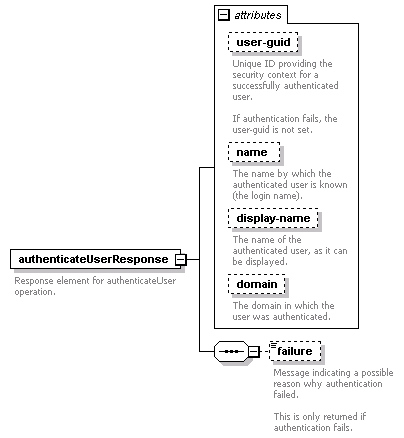| diagram |  |
||||||||||||||||||||||||||||||||||||||
| namespace | http://security.api.de.n2.tibco.com | ||||||||||||||||||||||||||||||||||||||
| properties |
|
||||||||||||||||||||||||||||||||||||||
| children | failure | ||||||||||||||||||||||||||||||||||||||
| attributes |
|
||||||||||||||||||||||||||||||||||||||
| annotation |
|
||||||||||||||||||||||||||||||||||||||
| source | <xs:element name="authenticateUserResponse"> <xs:annotation> <xs:documentation>Response element for authenticateUser operation.</xs:documentation> </xs:annotation> <xs:complexType> <xs:sequence> <xs:element name="failure" type="xs:string" minOccurs="0"> <xs:annotation> <xs:documentation>Message indicating a possible reason why authentication failed. This is only returned if authentication fails.</xs:documentation> </xs:annotation> </xs:element> </xs:sequence> <xs:attribute name="user-guid" type="xs:string" use="optional"> <xs:annotation> <xs:documentation>Unique ID providing the security context for a successfully authenticated user. If authentication fails, the user-guid is not set.</xs:documentation> </xs:annotation> </xs:attribute> <xs:attribute name="name" type="xs:string" use="optional"> <xs:annotation> <xs:documentation>The name by which the authenticated user is known (the login name).</xs:documentation> </xs:annotation> </xs:attribute> <xs:attribute name="display-name" type="xs:string" use="optional"> <xs:annotation> <xs:documentation>The name of the authenticated user, as it can be displayed.</xs:documentation> </xs:annotation> </xs:attribute> <xs:attribute name="domain" type="xs:string" use="optional"> <xs:annotation> <xs:documentation>The domain in which the user was authenticated.</xs:documentation> </xs:annotation> </xs:attribute> </xs:complexType> </xs:element> |
WSDL documentation generated by XMLSpy WSDL Editor http://www.altova.com/xmlspy